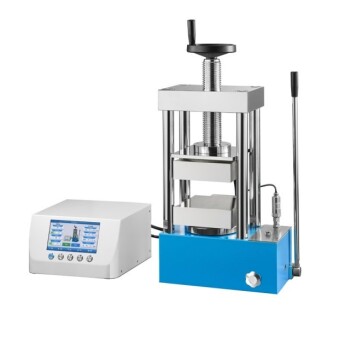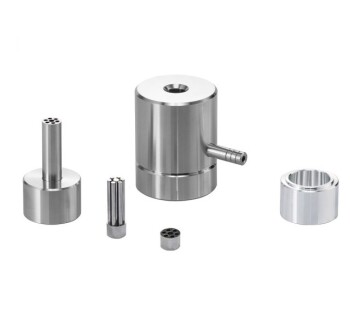At their core, electric hydraulic presses offer the immense force of a hydraulic system combined with the precision, automation, and efficiency of modern electric controls. This fusion allows them to deliver unparalleled power for heavy-duty tasks while maintaining the programmability and repeatability essential for high-quality production.
The central advantage of an electric hydraulic press is not just its power, but its ability to apply that power with intelligent, repeatable control. It bridges the gap between raw mechanical force and sophisticated, automated manufacturing.

The Core Principle: Merging Power with Precision
To understand the benefits, you must first understand the design. An electric hydraulic press uses an electric motor to drive a hydraulic pump, which then pressurizes fluid to move a ram. This hybrid approach is the source of its unique capabilities.
Unmatched Force Generation
The hydraulic system is a force multiplier. It allows a relatively small and efficient electric motor to generate enormous tonnage, making these presses ideal for forming, molding, and assembling dense, heavy-duty materials.
The Electric Advantage: Automation and Control
The electric motor and its associated control system are the "brains" of the operation. This allows for features like touchscreen interfaces, programmable logic controllers (PLCs), and precise sensors.
Operators can program specific cycles, controlling ram speed, position, and the exact amount of force applied. This removes guesswork and ensures every operation is identical.
Superior Efficiency
Modern electric hydraulic systems are often more energy-efficient than older, continuously running hydraulic presses. The electric motor only consumes significant power when actively building pressure for a cycle, reducing idle energy consumption.
Key Advantages in Application
The combination of power and control translates directly into tangible benefits for manufacturing, prototyping, and assembly.
Repeatability for Consistent Quality
For production runs, consistency is paramount. The ability to program a precise pressing cycle and repeat it thousands of time ensures that every part meets the exact same specifications. This is critical in industries like aerospace and medical device manufacturing.
Versatility Across Processes
A single press can be adapted for a wide range of tasks simply by adjusting its program. It can be used for high-force stamping, delicate assembly, or even specialized processes like thermal curing and bonding when integrated with heating elements.
Enhanced Operator Safety
Automation reduces direct operator interaction with the machine during a cycle. Furthermore, these presses are designed with built-in safety mechanisms, such as pressure relief valves and light curtains, to prevent over-pressurization and protect personnel.
Understanding the Trade-offs
No technology is without its considerations. Objectivity requires acknowledging the potential downsides.
Initial Investment Cost
The sophistication of the control systems and the robust nature of the high-pressure hydraulic components make electric hydraulic presses more expensive upfront than simpler manual or pneumatic presses.
Maintenance Considerations
While durable, the hydraulic system requires regular maintenance. This includes monitoring fluid levels, checking for leaks, and replacing filters and seals over time to ensure longevity and reliable performance.
System Complexity
The programmable nature of these presses, while a significant advantage, also introduces complexity. Proper training is required for operators and maintenance staff to fully leverage the machine's capabilities and troubleshoot any issues.
Making the Right Choice for Your Goal
Selecting the right press depends entirely on your specific application and priorities.
- If your primary focus is high-volume, precision manufacturing: The programmability and consistent force application of an electric hydraulic press are essential for ensuring part quality and process repeatability.
- If your primary focus is research, development, or prototyping: The versatility to easily adjust force, speed, and stroke, combined with precise control, makes it an invaluable tool for testing and iteration.
- If your primary focus is heavy-duty forming or assembly: The sheer, controllable force generated by the hydraulic system is the most critical advantage, enabling you to work with the toughest materials.
Ultimately, an electric hydraulic press is the definitive choice when your process demands both significant force and intelligent control.
Summary Table:
| Advantage | Description |
|---|---|
| Unmatched Force | Generates high tonnage for heavy-duty tasks like forming and molding dense materials. |
| Automation & Control | Programmable cycles with precise ram speed, position, and force for repeatable operations. |
| Superior Efficiency | Energy-efficient with reduced idle consumption, ideal for cost savings. |
| Consistent Quality | Ensures repeatability in production, critical for industries like aerospace and medical devices. |
| Versatility | Adaptable for various processes including stamping, assembly, and thermal curing. |
| Enhanced Safety | Built-in safety features like pressure relief valves and light curtains for operator protection. |
Ready to enhance your laboratory's efficiency with reliable and precise pressing solutions? KINTEK specializes in lab press machines, including automatic lab presses, isostatic presses, and heated lab presses, designed to meet your specific needs for manufacturing, prototyping, and research. Contact us today to learn how our electric hydraulic presses can deliver superior performance and value for your projects!
Visual Guide

Related Products
- Laboratory Hydraulic Press 2T Lab Pellet Press for KBR FTIR
- Laboratory Hydraulic Press Lab Pellet Press Button Battery Press
- Automatic Laboratory Hydraulic Press Lab Pellet Press Machine
- Automatic Laboratory Hydraulic Press for XRF and KBR Pellet Pressing
- Manual Laboratory Hydraulic Press Lab Pellet Press
People Also Ask
- What are some laboratory applications of hydraulic presses? Boost Precision in Sample Prep and Testing
- Why is sample uniformity critical when using a laboratory hydraulic press for humic acid KBr pellets? Achieve FTIR Accuracy
- What is the role of a hydraulic press in KBr pellet preparation for FTIR? Achieve High-Resolution Chemical Insights
- How is a laboratory hydraulic press used for Tb(III)-Organic Framework FT-IR samples? Expert Pellet Pressing Guide
- What role does a high-pressure laboratory hydraulic press play in KBr pellet preparation? Optimize FTIR Accuracy



















